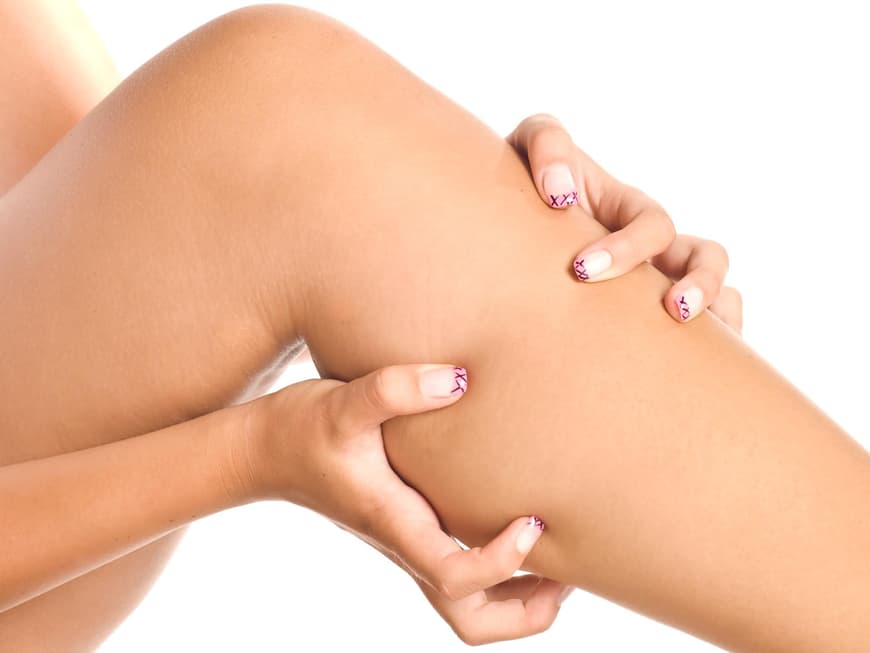
What exactly are muscle cramps?
A muscle cramp is when a muscle or muscle group suddenly tenses up, usually painfully. Calf cramps at night can be so severe that they wake you up. The next day it feels as if you have sore muscles.
However, the cramp is not actually caused by the muscle, but by the nerve that controls the muscle. The brain is the controller and sends electrical signals via the spinal cord to relax or tense the muscle. In simple terms, it can be said that cramps occur when the signals overlap. This is the case when the nerves send impulses independently of the brain signals and there is an overlap.
Incidentally, muscle cramps usually affect older people rather than young people over the age of 60. Shortened muscles, for example, are a particular trigger for calf cramps in older people. They can also be caused by those affected not drinking enough.
However, younger people, such as pregnant women, also often have problems with calf cramps. In this case, a magnesium deficiency is often the trigger for the cramps, as expectant mothers have an increased need for minerals.
Incidentally, muscle cramps very often occur in the so-called striated skeletal muscles. This mainly affects the calves, thighs, feet or hands.
Causes and first aid for muscle cramps
The causes of painful muscle cramps can be varied, but unless the two underlying conditions below apply, they are not usually a cause for concern:
- sporting overload
- constant wearing of high heels
- Electrolyte disorders such as magnesium deficiency
- Tense muscles due to lack of exercise or stretching
- Nerve diseases such as polyneuropathies, radiculopathies or epilepsy
- Nerve diseases such as diabetes or hypothyroidism
- Fluid deficiency
- People with foot deformities, for example a fallen arches foot
SOS: Do you have a muscle cramp? Many people remain in a kind of rigidity in order to protect themselves. This is wrong! Stretching and massaging helps to relieve cramps quickly. It is important to loosen the muscle!
You should see a doctor if
- the muscle cramps occur repeatedly
- the muscle cramps are extremely painful
- the cramps are accompanied by unpleasant symptoms (tingling, numbness, swelling)
- muscle cramps cannot be relieved by stretching and massaging
- you have persistent sleep disturbances
- you have the aforementioned underlying illnesses
What does the doctor do for muscle cramps?
First of all, he or she will talk to the patient to clarify any previous illnesses, dietary habits or a possible pregnancy, for example. You should also tell your GP exactly when and where the cramps occur and what you have done to treat them so far. You should also always inform the doctor about any medication you are taking.
After the consultation, the doctor can assess which examinations are now necessary to make a diagnosis. The preliminary consultation is usually followed directly by a physical examination and perhaps also a blood test. The doctor may also refer you to a specialist who will then make a diagnosis.
How can you prevent muscle cramps?
There are actually a few things you can do to prevent nasty muscle cramps. Refrain from
- too much coffee, i.e. caffeine
- too much alcohol
- cigarettes
- exercise after eating(in summer, wait around an hour before going swimming)
- bad footwear such as shoes that are too tight, wear high heels alternating with flat shoes
Also:
Drink plenty of fluids, especially after exercise (drink during too) and massage your calf muscles before going to bed. In some cases, magnesium supplements can also help. However, you should speak to your doctor or pharmacist before taking any long-term supplements.
What helps against muscle cramps during sport?
As already mentioned, it is advisable to drink plenty of fluids during exercise as a preventative measure. If a calf cramp occurs, take a short break and drink something. A gentle massage of the calf or walking a few steps can counteract the cramp. Stretching can also be helpful: Press the heel down and pull the toes up at the same time, proceeding very gently.
Date: 27.08.2020
Author: Tanja Seiffert
